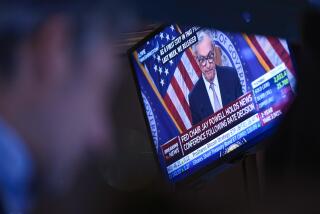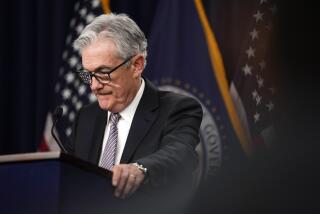Europe set to raise interest rates while Fed holds back
- Share via
The euro muscled to a new 14-month high against the dollar Wednesday, as markets braced for a controversial interest rate hike by the European Central Bank on Thursday.
The central bank is expected to raise its benchmark short-term rate to 1.25% from 1%, the first increase since mid-2008.
Like the U.S. Federal Reserve, the European body slashed short-term rates during the financial-system meltdown in late 2008 and has held them steady since then as a tool to bail out banks and revive the economy.
Unlike their counterparts in Washington, the Frankfurt-based central bankers think rising food and energy inflation is enough of a problem to justify tightening credit now. Europe would be following the many emerging-market central banks that began to raise rates last year as food and energy costs jumped. China this week tightened credit for a fourth time since October.
Fed policymakers, by contrast, still are debating what to do next, as the minutes of their last meeting showed. The Fed is continuing to hold its benchmark rate between zero and 0.25%.
Jean-Claude Trichet, president of the European Central Bank, signaled March 3 that a rate increase Thursday was possible. Despite the advance notice, anticipation of the move gave the euro a further lift Wednesday. The currency rose to $1.433, up from $1.422 on Tuesday and its highest level since January 2010. The euro has surged from $1.29 in early January.
Higher interest rates tend to attract money to a currency, boosting its purchasing power. But a stronger euro also will make European exports more expensive abroad — another blow to the countries at the heart of the continent’s government-debt crisis, including Greece, Ireland and Portugal.
“Higher interest rates and a stronger euro are bad news for the debt-challenged members of the European Union,” said Ed Yardeni, an economist and head of Yardeni Research in New York.
Some U.S. economists say the Europeans may be making a grave mistake if they begin to raise rates, with economic growth still weak in much of Europe and negative in the most troubled countries.
“In our view, this would dramatically increase the risk of more debt trauma . . . and a hard-landing scenario for the euro zone as a whole,” said Michael Darda, chief economist at MKM Partners in Stamford, Conn., in a note to clients.
But that doesn’t seem likely to deter the euro zone’s central bank, which has only one official mandate: Keep inflation suppressed, at an annualized 2% or lower. In March, prices were up 2.6% from a year earlier across the euro zone, accelerating from a 2.4% year-over-year rate in February.
More to Read
Inside the business of entertainment
The Wide Shot brings you news, analysis and insights on everything from streaming wars to production — and what it all means for the future.
You may occasionally receive promotional content from the Los Angeles Times.










